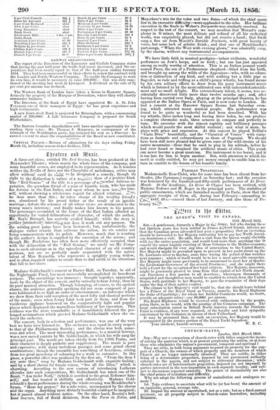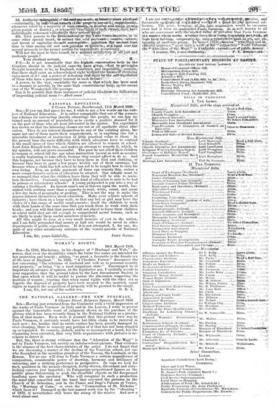CHURCH-RATES.
London, 10th March 1856. Six—May not a comparison of church-rates with tithes suggest the means- of solving the question which is at present perplexing the nation, or at least those who administer the nation's government, temporal and spiritual ? They are alike in both being payments imposed on property for the sup-- port of a Church,' the owners of which property and the members of which: Church arc no longer universally identical. They are unlike, in tithes being of a determinate proportion, imposed by one paramount authority external to the payers, and not subject to reiterated discussion' while church-rates are of indeterntinate proportion, imposed (or not impesed) by parties interested in the non-imposition in each separate locality, and sub- ject to discussions repeated annually. The points of dissimilarity are also the chief points of irritation and difficulty.
Why not adopt the following process of assimilation and analogous re- medy?
1st. Take evidence to ascertain what will be (or has been) the amount of an equitable, general, average rate.
2d. Impose the amount so ascertained, not as a rate, but as a fixed annual payment, on all property subject to church-rates heretofore, including Braintree.
3d.. Authorize rethsiwthitiof thaieitivaymertiz;.4toiait -parithasti:
—voluntarily, by in*videgi,*xtuett,octhe Lieoperty; 41)eetuisocily,-. whenever voted by a majority of such-oisinerarniamni 1A'aPiirt
given parish or district fiviieneNeettito.:t one. bare individually redeemed !Olt 4th. Give powers to the EMilesitistaetillAtt•the:. Ceiairnihi. some other special board,..tu ceollect..thel'sdielaYmeste ; enfore4 and invest or capitalize theeaid .recleits ; .Nipertien. *el namtunt. fines- time to time among old and new.., ex; trictsi. andrhsjuF1 over-the annual proceeds to the proper parties for uz:21.ti#,gee.9r(lingly; Will not the knot be thus loosed; in a in 41 saffictory to all just and moderate people ? 1. • 173 ipt. Pt, kingdom should in its judicial capacity . tpfori*viyles- thought heretofore to be, in England, me.
that there shall exist an acknowledged rightroci. ;lathe thkaiisteobtaiiiing enjoyment of it ? and a power of defeating thhttinht by the sell4t5gisintitIn
of those who have a pecuniary interest in such defeat?: • -- -
A power, by the way, essentially the same as 4,hat-which,ltas bemused. in a manner so notable, by the same high constitutioniil bod,y, *the recent- case of the Wensleydale life-peerage.
Can it be possible that these instances of judicial blindon— *Hire hal:cations of impending judicial doom ?—Absit omen !



























 Previous page
Previous page